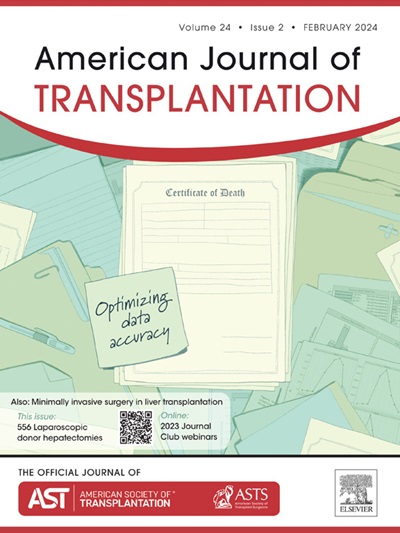Donor-specific mesenchymal stem cell infusion in human and nonhuman primate kidney transplantation
IF 8.2
2区 医学
Q1 SURGERY
引用次数: 0
Abstract
We report the results of 2 independent, concurrently performed studies evaluating the safety and efficacy of donor-derived mesenchymal stromal cell (MSC) infusions in inducing immune-tolerance in nonhuman primate (NHP) and human kidney transplant recipients treated with depletional induction and belatacept/sirolimus maintenance. Fifteen NHPs received rhesus ATG induction and were divided into 3 groups: control (n = 6), pretransplant thymic irradiation (n = 4), and thymic irradiation with monthly donor-MSC infusion (n = 5). Sirolimus was discontinued at day-180, and belatacept at day-365 posttransplant. In humans, 6 patients enrolled in ITN062ST underwent transplantation with alemtuzumab induction; 4 received 12 monthly donor-MSC infusions followed by immunosuppression withdrawal (ISW) if eligible. Donor-MSC infusion was acutely well tolerated in humans and NHPs. Chimerism was not established, and tolerance was not induced in either study. Two of the 5 NHPs that received MSCs rejected while on belatacept monotherapy with detectable donor-specific antibodies. Two patients did not initiate ISW due to de novo donor-specific antibodies and borderline rejection, and 2 patients failed ISW due to reversible rejection. In conclusion, donor MSCs can be given to NHPs or humans repeatedly without acute consequences, but they neither lead to detectable chimerism nor induce tolerance. In a subset of recipients, infused MSCs can be sensitizing.
供体特异性间充质干细胞输注在人和非人灵长类动物肾移植中的应用。
我们报告了两项独立的同时进行的研究的结果,评估了供体来源的间充质间质细胞(MSC)输注在非人灵长类动物(NHP)和人肾移植受者中诱导免疫耐受的安全性和有效性,这些受者接受了消耗性诱导和贝拉西普/西罗莫司维持治疗。15例NHPs接受恒河猴ATG诱导,分为3组:对照组(n=6)、移植前胸腺照射组(TI, n=4)和TI联合每月供体间充质干细胞输注组(n=5)。西罗莫司在移植后第180天停用,并在移植后第365天停用。在人类中,6名参与ITN062ST的患者接受了阿仑单抗诱导的移植;四名患者接受了12个月的供体- msc输注,如果符合条件,随后进行免疫抑制停用(ISW)。在人类和NHPs中,供体- msc输注具有良好的耐受性。两项研究均未建立嵌合,也未诱导出耐受性。接受MSCs的5名NHPs中有2名在接受可检测供者特异性抗体(DSA)的belatacept单药治疗时出现排斥反应。2例患者由于新发DSA和边缘性排斥而未开始ISW, 2例患者由于可逆性排斥而失败。总之,供体间充质干细胞可以反复给予NHPs或人类而不会产生急性后果,但它们既不会导致可检测到的嵌合,也不会诱导耐受。在一部分受体中,注入的间充质干细胞可致敏。试验注册。ClinicalTrials.gov - NCT03504241。
本文章由计算机程序翻译,如有差异,请以英文原文为准。
求助全文
约1分钟内获得全文
求助全文
来源期刊
CiteScore
18.70
自引率
4.50%
发文量
346
审稿时长
26 days
期刊介绍:
The American Journal of Transplantation is a leading journal in the field of transplantation. It serves as a forum for debate and reassessment, an agent of change, and a major platform for promoting understanding, improving results, and advancing science. Published monthly, it provides an essential resource for researchers and clinicians worldwide.
The journal publishes original articles, case reports, invited reviews, letters to the editor, critical reviews, news features, consensus documents, and guidelines over 12 issues a year. It covers all major subject areas in transplantation, including thoracic (heart, lung), abdominal (kidney, liver, pancreas, islets), tissue and stem cell transplantation, organ and tissue donation and preservation, tissue injury, repair, inflammation, and aging, histocompatibility, drugs and pharmacology, graft survival, and prevention of graft dysfunction and failure. It also explores ethical and social issues in the field.

 求助内容:
求助内容: 应助结果提醒方式:
应助结果提醒方式:


